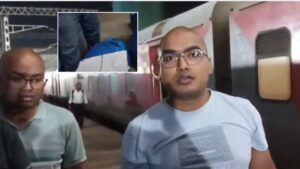Lucknow Doctors Perform Brain Surgery while patient fiddles with phone

Lucknow doctors remove brain tumour while patient fiddles with phone
On Wednesday, doctors at the Kalyan Singh Cancer Institute in Chak Ganjaria successfully removed a brain tumor using the Awake Craniotomy technique. This innovative approach allows the patient to remain awake throughout the surgery, and in this case, the patient was engaged in using his phone during the operation. The patient, Harishchandra Prajapati had been experiencing persistent headaches and weakness in his left limbs before being diagnosed with a brain tumor.
Awake craniotomy is a surgical procedure performed on the brain while the patient is fully conscious. It is particularly useful for treating various neurological conditions, including specific brain tumors and epilepsy. This technique aims to minimize the risk of nerve damage, which is a common concern during such surgeries.
“The decision to use the Awake Craniotomy technique was made to reduce the likelihood of nerve injury,” stated the head of the neurosurgery department.
During the procedure, the medical team utilized a nerve monitoring device to track the patient’s brain activity. This method not only allowed for the safe removal of the tumor but also helped protect the nerves that control movement in the hands and legs. In cases where your tumor or the part of your brain that triggers seizures is situated near the areas that control vision, movement, or speech, it may be essential for you to stay awake during the surgery. Your surgeon will probably engage you in conversation and monitor your brain’s responses as you answer.
Your feedback is crucial for your surgeon to accurately target the appropriate area of your brain during the procedure.
Dr. Devashish Shukla, the medical superintendent of the institute, explains, “The use of a nerve monitoring machine for brain mapping was essential in directing the surgery and safeguarding vital brain functions.”
The surgical team comprised Dr. Vijendra Kumar, Dr. Amit Upadhyay, Dr. Vipin Sahu, and resident Dr. Anjani Singh. The anesthesia department, led by Dr. Asim Rashid and supported by Dr. Ruchi Saxena and senior resident Dr. Shruti, played a key role in ensuring the procedure’s success, focusing on the patient’s comfort and stability throughout the operation.
When surgical removal of a tumor or a specific part of the brain responsible for seizures is necessary, doctors must ensure that they do not harm regions that influence language, speech, and motor skills. Identifying these areas with precision prior to surgery can be challenging.












